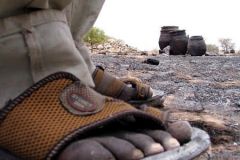Sudan asserts its own ability to deal with Darfur war crime suspects
KHARTOUM, April 30, 2005 (Xinhua) — The Sudanese government asserted on Saturday its own ability to deal with war crime suspects in the Darfur crisis.

|
|
A displaced Sudanese man looks at his destroyed house after militiamen burnt the Sereaf village, in west Darfur along the Sudan and Chad border, April 22, 2005. (Reuters). |
Sudanese Foreign Minister Mustafa Othman Ismail made the remarks in a statement issued at an emergency session of the Sudanese National Council, reported the Sudan News Agency.
In the statement, Ismail said that Sudan’s judiciary organs were capable to provide justice and the government will not allow criminals to escape punishment.
In March, the UN Security Council adopted its resolution 1593, which decides to send war crime suspects in Darfur to the International Criminal Court based in The Hague.
The resolution, however, left the door open for Sudan to conduct its own trial of the war crime suspects provided that the trial proved credible.
Sudan has rejected the resolution, saying it lacks the base of objective justice and violates its sovereignty.
Ismail said the government will continue its efforts to solve the Darfur conflict and mobilize a supportive regional and international stance to back Sudan’s own efforts to settle the issue.
The Sudanese government will handle the Darfur crisis through the African inherited principles which acknowledge equality, justice and compensation, he stressed.
The Sudanese minister also noted that the government will continue its struggle to invalidate any falsity against Sudan, adding that the Sudanese diplomacy is confident and will confront the difficulties.
Meanwhile, Ismail acknowledged what he called “the positive side of the resolution 1593”, saying the resolution orders the Darfur rebels to mark their locations and it demands some neighboring countries of Sudan to stop destabilizing the country.
Rebels took up arms more than two years ago in Sudan’s arid western Darfur region, accusing the central government of neglect. Many people were killed in the conflict and more displaced.
